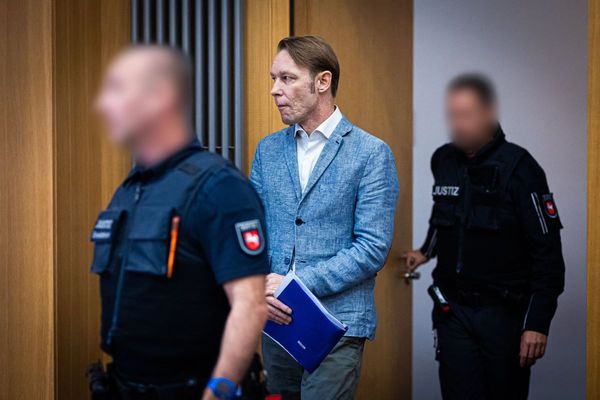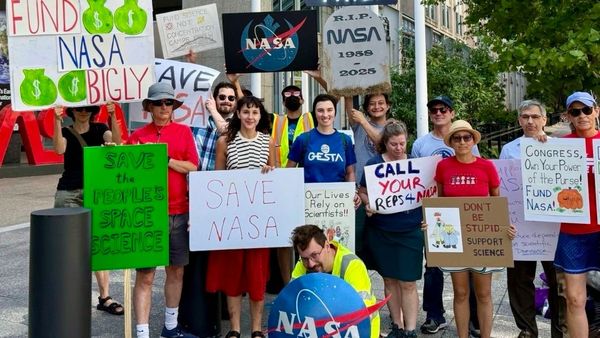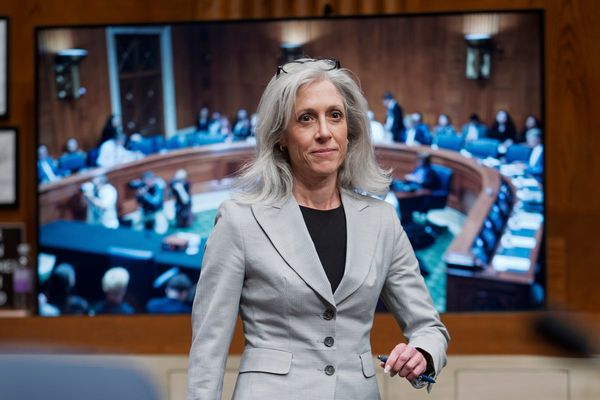
Autumn days in Melbourne can be glorious. This isn’t one of them.
It’s damp and dismal, and early voters struggle to find a park at the Holy Family Parish Catholic church in suburban Mount Waverley.
They arrive in a steady stream, striding purposefully through the clutch of primary-coloured volunteers handing out how-to-vote cards. Today the contenders — sitting Liberal MP Gladys Liu and Labor challenger Carina Garland — are both here, warmly greeting each constituent: “Hi, I’m Gladys” and “Hi, I’m Carina”.
Every vote counts, as their leaders repeat ad infinitum. Few stop to chat.
In the home stretch in this drawn-out six-week election campaign, if the vibe at the Mount Waverley pre-poll booth is any indication, everyone just wants it to please be over. The hyper-marginal electorate stretching across south-east suburbia has seen more than its share of the political carnival.
On Friday, May 13, the prime minister was just down the road, donned in a lab coat and wielding a soldering iron at a nearby microchip manufacturing business. It was Scott Morrison’s fourth campaign visit to the neighbourhood, running the gamut from an Easter church service to a lolly shop. Former Liberal PM John Howard has also dropped in.
Labor Leader Anthony Albanese has visited twice, stopping for coffee with locals in Mount Waverley and a doorstop at a nearby TAFE, then circling back to announce $2.2 billion for the suburban rail loop alongside Victorian Premier Daniel Andrews. Former Labor prime minister Kevin Rudd popped by too, bubble tea in hand, to campaign alongside Garland in Box Hill.
Chisholm is proudly diverse in all realms — culturally, economically and by inclination. Its enclaves embrace Chinese and Greeks, battlers and nobs, soft hearts residing in tree-lined avenues, hard heads in the business precincts. When our team of reporters interviewed voters, their priorities reflected that mix: climate change, lack of affordable housing, reforming Australia’s migration system, refugee rights, disability, childcare and aged care, and the management of the pandemic.
Checking back in with those voters as the clock counts down, we found most were unmoved, indeed unimpressed, by the campaign. Most say their votes will be determined by policies rather than personalities and performances.
Peter Vadiveloo and his partner Belinda Haydon are disappointed the need for action on climate change has not featured more prominently. “It’s universally the thing that concerns most Australians and neither [party] are daring to say anything because they’re too afraid to speak,” Vadiveloo says.
ABC Vote Compass found climate change was the top concern for Australians generally. But for this couple, the offerings of both major parties fall short — and both still plan to vote Green.
“The [Liberal National Party’s] targets are consistent with 3 degrees of global warming and Labor is consistent with 2 degrees. It’s only the teal independents and the Greens who have policies that will keep us at 1.5 degrees global warming,” says Haydon.
First-time voter Kyra Hatsikosmidis has been inundated with political ads, in person, on YouTube, television and in the mailbox. “I see Gladys wherever I turn,” she says, referring to corflutes and posters of Liu around the neighbourhood.
Everywhere, that is, except where she had wanted to see the Liberal MP turn up — at the climate change forum on April 30 that Hatsikosmidis helped organise. Nor was it the only forum where the Liberal candidate’s seat was left empty.
Rising property prices were a key concern for Chinese-Australian bus driver Xin Yang, who wants his children to be able to afford a house one day.
Yang says he did not pay much attention to the election until recently when something caught his eye among the election material in his mailbox: “I noticed one thing from the Labor Party. Anthony Albanese mentioned the first-home buyer policy. It’s a new policy. If the property is a new home, they will cover 40% of the purchase price.”
Alison Cooke is still weighing up who to vote for and has been underwhelmed by both major parties.
Aged care and the National Disability Insurance Scheme are the two issues important to Cooke, and could potentially sway her towards Labor: “I guess Labor is kind of standing out a bit more for me for those two areas, particularly NDIS.”
Mannie Kaur Verma — a Labor Party member — says childcare and gender equality are her priorities, along with reforming what she describes as an unfair and unjust migration system. The Indian-born Australian says she’s ready for a new government, “one that’s more focused on women and really trying to bridge that gap for gender equality, and you know, just a better future really”.
Many people she’s spoken to in Chisholm have already voted, either by post or pre-poll. And like those striding confidently into the pre-poll booth: “I think the majority of people know what they want now.”
Permaculturalist Delldint Fleming has been methodically researching all the candidates — both for Chisholm and the Senate — looking into their policies and voting history. Her share house of five has been engaging in quite a few political discussions “about policies and kind of comparing each other’s notes on what we think is good and why”.
Fleming’s method is to write up all the candidates on a big piece of paper, placing boxes next to their names. She colours these red or green, depending on whether she thinks the candidate has good or bad policies. If they have no policy on an issue she leaves their box blank.
Neighbourhood news site Eastsider News had hoped to make it easier for locals like Fleming to weigh up Chisholm’s candidates, inviting all 12 aspirants to provide a statement for an election special. Editor John Malvestuto says he’s been disappointed, receiving “zero response back” from the two major parties.
He says Garland and Liu have been throwing their effort into swaying early voters, spending much of their time at the pre-polling station in Mount Waverley, handing out how-to-vote cards and campaigning at the booth.
Additional reporting by Matilda Finn, Caitlin Duan, Alexander Dabb, Greg Hall and Sean Ruse







